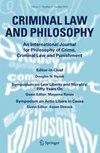Public Wrongs and Power Relations in Non-Democratic & Illiberal Polities
IF 0.7
Q2 LAW
引用次数: 0
Abstract
Abstract One of the influential contributions to criminalisation theories is Duff’s work on public wrongs, which offers a thin master principle of criminalisation, proposing that we have a reason to criminalise a type of conduct if it constitutes a public wrong; one that violates a polity’s civil order and forms part of that polity’s proper business. The nature of the civil order, the scope of its proper business, and the distinction between the public and private realms of wrongs are context-relative to each polity, structured by their legal, institutional, and informal values and ways of life. Such a context-relative view led to problematic criminalisation examples raised by Duff and his critics. This article engages more fully with the relativism of the civil order and public wrongs in non-democratic and illiberal contexts. It draws on examples such as Saudi Arabi and Iran, and Beetham’s work on the legitimation of power to argue that conceptualising the civil order as an undifferentiated whole that represents a polity’s chosen way of life overlooks the ways in which the civil order’s values and practices are shaped by relations of power and exclusion rules and processes. This, in turn, exposes the theory to the risk of mirroring and legitimising unequal relations of power and impeding efforts to change them. This is also due to the theory’s lack of proper normative guidance on the legitimacy of criminalisation. The potential commitment to – instead of a preference for – democracy and guarantees of equality and freedoms might help strengthen the theory normatively, but it is insufficient to guard against the raised problems.非民主社会中的公共过错与权力关系狭隘的政治
对刑事化理论有影响的贡献之一是Duff关于公共错误的工作,该工作提供了刑事化的一个单薄的主原则,提出如果一种行为构成公共错误,我们有理由将其定为刑事犯罪;违犯某一政体的民事秩序并构成该政体正当事务一部分的人。民事秩序的性质,其正当业务的范围,以及公共和私人错误领域之间的区别是与每个政体相关的背景,由其法律,制度和非正式的价值观和生活方式构成。这种与情境相关的观点导致了Duff和他的批评者提出的有问题的刑事定罪例子。本文更全面地探讨了非民主和非自由背景下的公民秩序和公共错误的相对主义。它借鉴了沙特阿拉伯和伊朗等例子,以及比瑟姆关于权力合法性的著作,认为将公民秩序概念化为一个代表政体选择的生活方式的无差别整体,忽略了公民秩序的价值观和实践是由权力关系和排他性规则和过程形成的。反过来,这又使这一理论面临着反映不平等权力关系并使其合法化的风险,并阻碍了改变这种关系的努力。这也是由于该理论在刑事定罪的合法性方面缺乏适当的规范指导。对民主和保障平等与自由的潜在承诺(而不是偏好)可能有助于从规范上加强这一理论,但这不足以防范所提出的问题。
本文章由计算机程序翻译,如有差异,请以英文原文为准。
求助全文
约1分钟内获得全文
求助全文
来源期刊
CiteScore
1.10
自引率
0.00%
发文量
24
期刊介绍:
Rationale The philosophy of crime and criminal law has been undergoing a renaissance.Increasing numbers of lawyers and philosophers are researching, writing and teaching in the area. Lawyers who are exploring theoretical issues related to criminal liability and punishment find that they must turn to philosophy. Philosophers recognise the importance of the criminal law as a focus for both analytical and normative inquiry. The practical importance of the subject is also obvious, especially at a time when western governments are having to reconsider their rationales for criminalization and sentencing in the light of substantial changes in criminal justice systems and their social contexts. Until recently, there was no journal solely devoted to the philosophy of crime and criminal law. Criminal Law and Philosophy fills this gap, and provides a platform for the high quality work that is being done in this area.
High quality content; specific and inclusive in scope Criminal Law and Philosophy aims to publish high quality articles that take a philosophical perspective on any issues in the broad field of crime and punishment. The main areas and topics include: crime and criminalization; the content, principles and structure of substantive criminal law; criminal justice and the criminal process; punishment and sentencing. The journal is inclusive in its scope: it publishes articles with a historical focus on earlier philosophical discussions of crime and punishment, as well as articles with a more contemporary focus. It seeks contributions from a range of philosophical schools and approaches, in particular both from analytically oriented philosophers and from those who draw more on contemporary continental philoshophy. Readership Criminal Law and Philosophy is becoming essential reading for academics in philoso phy, in law and in criminology who take a philosophically informed critical, analytical or normative approach to the criminal law and criminal justice. It is also an important resource for students in those subjects, and for practitioners with an interest in philosophical approaches to their practice. Through this journal, readers can access the latest thinking by the best scholars in the philosophy of crime and punishment. Editorial Board The editors, editorial board and advisors constitute an impressive, international group of leading scholars working in the philosophy of crime and punishment. They represent a variety of systems of criminal law, including systems that cross national boundaries.

 求助内容:
求助内容: 应助结果提醒方式:
应助结果提醒方式:


